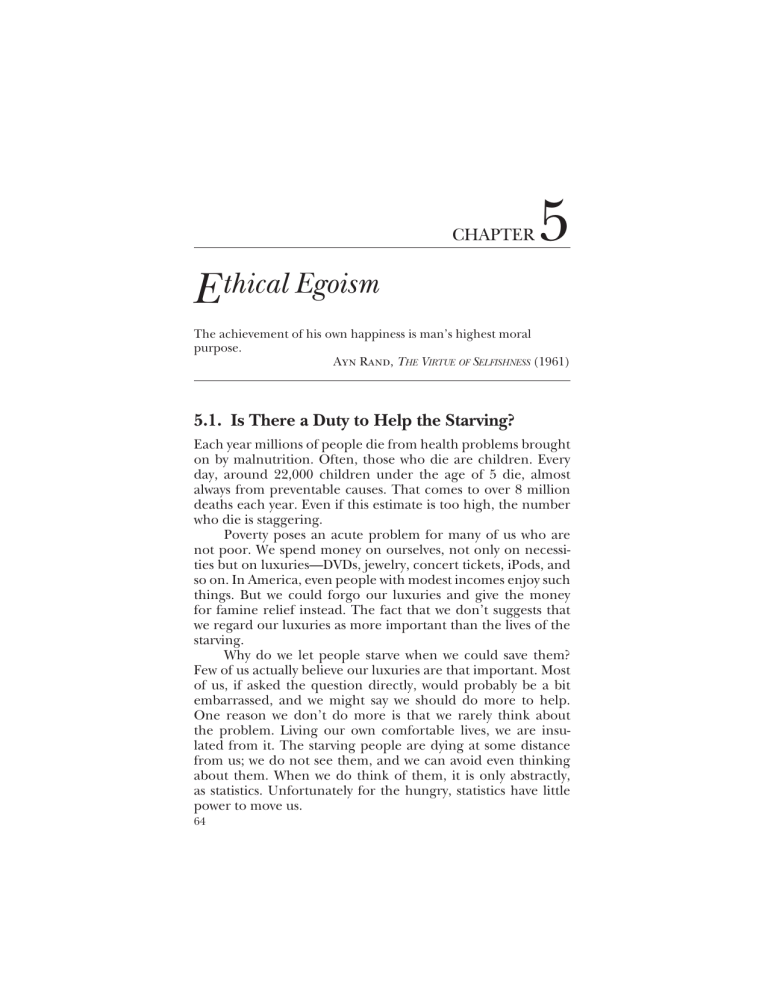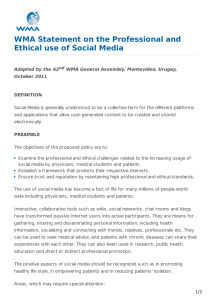
CHAPTER 5 E thical Egoism The achievement of his own happiness is man’s highest moral purpose. Ayn Rand, THE VIRTUE OF SELFISHNESS (1961) 5.1. Is There a Duty to Help the Starving? Each year millions of people die from health problems brought on by malnutrition. Often, those who die are children. Every day, around 22,000 children under the age of 5 die, almost always from preventable causes. That comes to over 8 million deaths each year. Even if this estimate is too high, the number who die is staggering. Poverty poses an acute problem for many of us who are not poor. We spend money on ourselves, not only on necessities but on luxuries—DVDs, jewelry, concert tickets, iPods, and so on. In America, even people with modest incomes enjoy such things. But we could forgo our luxuries and give the money for famine relief instead. The fact that we don’t suggests that we regard our luxuries as more important than the lives of the starving. Why do we let people starve when we could save them? Few of us actually believe our luxuries are that important. Most of us, if asked the question directly, would probably be a bit embarrassed, and we might say we should do more to help. One reason we don’t do more is that we rarely think about the problem. Living our own comfortable lives, we are insulated from it. The starving people are dying at some distance from us; we do not see them, and we can avoid even thinking about them. When we do think of them, it is only abstractly, as statistics. Unfortunately for the hungry, statistics have little power to move us. 64 ETHICAL EGOISM 65 We respond differently when there is a “crisis,” as when an earthquake struck Japan in 2011, killing thousands, triggering a tsunami, and causing meltdowns at several nuclear power plants. Then the crisis is big news and relief efforts are mobilized. But when the needy are scattered, the situation does not seem so pressing. The 8 million children who die every year would probably be saved if they were all gathered in, say, Chicago. But leaving aside the question of why we behave as we do, what is our duty? What should we do? Common sense might tell us to balance our own interests against the interests of others. It is understandable, of course, that we look out for ourselves, and people cannot be blamed for attending to their own basic needs. But at the same time, the needs of others are important, and when we can help others—especially at little cost to ourselves—we should do so. So, if you have an extra $10, and giving it to charity would help save a child’s life, then commonsense morality would say that you should do so. This way of thinking assumes that we have duties to others simply because they are people who could be helped or harmed by what we do. If a certain action would benefit (or harm) other people, then that is a reason why we should (or should not) perform that action. The commonsense assumption is that other people’s interests count, from a moral point of view. But one person’s common sense is another person’s naïve platitude. Some people believe that we have no duties to others. On their view, known as Ethical Egoism, each person ought to pursue his or her own self-interest exclusively. This is the morality of selfishness. It holds that our only duty is to do what is best for ourselves. Other people matter only insofar as they can benefit us. 5.2. Psychological Egoism Before we discuss Ethical Egoism, we should discuss a theory it is often confused with—Psychological Egoism. Ethical Egoism claims that each person ought to pursue his or her own self-interest exclusively. Psychological Egoism, by contrast, asserts that each person does in fact pursue his or her own self-interest exclusively. Thus, these theories are very different. It is one thing to say that people are self-interested and that our neighbors will not give to charity. It is quite another thing to say that people ought to be 66 THE ELEMENTS OF MORAL PHILOSOPHY self-interested and that our neighbors ought not to give to charity. Psychological Egoism makes a claim about human nature, or about the way things are; Ethical Egoism makes a claim about morality, or about the way things should be. Psychological Egoism is not a theory of ethics; rather, it is a theory of human psychology. But ethicists have always worried about it. If Psychological Egoism were true, then moral philosophy itself would seem pointless. After all, if people are going to behave selfishly no matter what, then what’s the point of discussing what they “ought” to do? Whatever it is they “ought” to do, they aren’t going to do it. It might be naïve of us to think that our moral theories can matter in the real world. Is Altruism Possible? When World War II began, Raoul Wallenberg was an unknown businessman living in Sweden. Sweden was a good place to be during the war. As a neutral country, it was never bombed, blockaded, or invaded. Yet, in 1944, Wallenberg voluntarily left Sweden for Nazi-controlled Hungary. Officially, Wallenberg was going to be just another Swedish diplomat in Budapest. However, his real mission was to save lives. In Hungary, Hitler had begun implementing his “final solution to the Jewish problem”: Jews were being rounded up, deported, and then murdered at Nazi killing stations. Wallenberg wanted to stop the slaughter. Wallenberg did help to persuade the Hungarian government to halt the deportations. However, the Hungarian government was soon replaced by a Nazi puppet regime, and the mass killing resumed. Wallenberg then issued “Swedish Protective Passes” to thousands of Jews, insisting that they all had connections to Sweden and were under the protection of his government. Wallenberg helped many people hide. When they were discovered, he would stand between them and the Nazis, telling the Germans that they would have to shoot him first. Wallenberg saved thousands of human lives. At the end of the war, when chaos prevailed, he stayed behind as other diplomats fled. After the war, Wallenberg disappeared, and for a long time his fate was unknown. Now we believe that he was killed, not by the Germans, but by the Soviets, who imprisoned him after taking over Hungary. Wallenberg’s story is especially dramatic, but it is not unique. The Israeli government recognizes over 22,000 Gentiles ETHICAL EGOISM 67 who risked their lives trying to save Jews from being murdered in the Holocaust. The Israelis call these women and men “The Righteous among the Nations.” And though few of us have saved lives, acts of altruism appear to be common. People do favors for one another. They give blood. They build homeless shelters. They volunteer in hospitals. They read to the blind. Many people give money to worthy causes. In some cases, the amount given is extraordinary. Warren Buffett, an American businessman, gave $37 billion to the Bill and Melinda Gates Foundation to promote global health and education. Zell Kravinsky, an American real estate investor, gave his entire $45-million fortune to charity. And then, for good measure, Kravinsky donated one of his kidneys to a complete stranger. Oseola McCarty, an 87-year-old African-American woman from Hattiesburg, Mississippi, gave $150,000 to endow a scholarship fund at the University of Southern Mississippi. For 75 years, she had saved up money, working as a maid. She never owned a car, and at the age of 87 she still walked over a mile to the nearest grocery store, pushing her own shopping cart. These are remarkable deeds, but should they be taken at face value? According to Psychological Egoism, we may believe ourselves to be noble and self-sacrificing, but that is only an illusion. In reality, we care only for ourselves. Could this theory be true? Why have people believed it, in the face of so much evidence to the contrary? Two arguments are often given for Psychological Egoism. The Argument That We Always Do What We Want to Do. “Every act you have ever performed since the day you were born was performed because you wanted something.” So wrote Dale Carnegie, author of the first and best self-help book, How to Win Friends and Influence People (1936). Carnegie thought of desire as the key to human psychology. Thus, when we describe one person’s action as altruistic and another person’s action as selfinterested, we may be overlooking the fact that in each case the person is merely doing what he or she most wants to do. For example, if Raoul Wallenberg chose to go to Hungary, then he wanted to go there more than he wanted to remain in Sweden—and why should he be praised for altruism when he was only doing what he wanted to do? His action sprang from his own desires, from his own sense of what he wanted. Thus, he was moved by 68 THE ELEMENTS OF MORAL PHILOSOPHY his own self-interest. And because the same may be said about any alleged act of kindness, we can conclude that Psychological Egoism must be true. This argument, however, is flawed. There are things that we do, not because we want to, but because we feel that we ought to. For example, I may write my grandmother a letter because I promised my mother I would, even though I don’t want to do it. It is sometimes suggested that we do such things because we most want to keep our promises. But that is not true. It is simply false to say that my strongest desire is to keep my promise. What I most want is to break my promise, but I don’t, as a matter of conscience. For all we know, Wallenberg was in this position: Perhaps he wanted to stay in Sweden, but he felt that he had to go to Hungary to save lives. In any case, the fact that he chose to go does not imply that he most wanted to do so. The argument has a second flaw. Suppose we concede that we always act on our strongest desires. Even if this were so, it would not follow that Wallenberg acted out of self-interest. For if Wallenberg wanted to help others, even at great risk to himself, then that is precisely what makes his behavior contrary to Psychological Egoism. The mere fact that you act on your own desires does not mean that you are looking out for yourself; it all depends on what you desire. If you care only about yourself and give no thought to others, then you are acting out of selfinterest; but if you want other people to be happy, and you act on that desire, then you are not. To put the point another way: In assessing whether an action is self-interested, the issue is not whether the action is based on a desire; the issue is what kind of desire it is based on. If you want to help someone else, then your motive is altruistic, not self-interested. Therefore, this argument goes wrong in just about every way that an argument can go wrong: The premise is not true— we don’t always do what we most want to do—and even if it were true, the conclusion would not follow from it. The Argument That We Always Do What Makes Us Feel Good. The second argument for Psychological Egoism appeals to the fact that so-called altruistic actions produce a sense of selfsatisfaction in the person who performs them. Acting “unselfishly” makes people feel good about themselves, and that is the real point of it. ETHICAL EGOISM 69 According to a 19th-century newspaper, this argument was made by Abraham Lincoln. The Springfield, Illinois, Monitor reported: Mr. Lincoln once remarked to a fellow-passenger on an old-time mud coach that all men were prompted by selfishness in doing good. His fellow-passenger was antagonizing this position when they were passing over a corduroy bridge that spanned a slough. As they crossed this bridge they espied an old razor-backed sow on the bank making a terrible noise because her pigs had got into the slough and were in danger of drowning. As the old coach began to climb the hill, Mr. Lincoln called out, “Driver, can’t you stop just a moment?” Then Mr. Lincoln jumped out, ran back, and lifted the little pigs out of the mud and water and placed them on the bank. When he returned, his companion remarked: “Now, Abe, where does selfishness come in on this little episode?” “Why, bless your soul, Ed, that was the very essence of selfishness. I should have had no peace of mind all day had I gone on and left that suffering old sow worrying over those pigs. I did it to get peace of mind, don’t you see?” In this story, Honest Abe employs a time-honored tactic of Psychological Egoism: the strategy of reinterpreting motives. Everyone knows that people sometimes seem to act altruistically; but if we look deeper, we may find that something else is going on. And usually it is not hard to discover that the “unselfish” behavior is actually connected to some benefit for the person who does it. Thus, Lincoln talks about the peace of mind he got from rescuing the pigs. Other examples of alleged altruism can also be reinterpreted. According to some of Raoul Wallenberg’s friends, before traveling to Hungary he was depressed and unhappy that his life wasn’t amounting to much. So he undertook deeds that would make him a heroic figure. His quest for a more significant life was spectacularly successful—here we are, more than 60 years after his death, talking about him. Mother Teresa, the nun who spent her life working among the poor in Calcutta, is often cited as a perfect example of altruism—but, of course, she believed that she would be handsomely rewarded in heaven. And as for Zell Kravinsky, who gave away both his fortune and a kidney, his parents never gave him much praise, so 70 THE ELEMENTS OF MORAL PHILOSOPHY he was always trying to do things that even they would admire. Kravinsky himself said that, as he began to give away his money, he came to think of a donation as “a treat to myself. I really thought of it as something pleasurable.” Despite all this, Lincoln’s argument is badly flawed. It may be true that one of Lincoln’s motives in saving the pigs was to preserve his own peace of mind. But the fact that Lincoln had a self-interested motive doesn’t mean that he didn’t have benevolent motives as well. In fact, Lincoln’s desire to help the pigs might have been even greater than his desire to preserve his peace of mind. And if this isn’t true in Lincoln’s case, it will be true in other cases: If I see a child drowning, my desire to help that child will usually be greater than my desire to avoid a guilty conscience. Cases like these are counterexamples to Psychological Egoism. In some instances of altruism, we may have no selfinterested motives. For example, in 2007, a 50-year-old construction worker named Wesley Autrey was waiting for a subway train in New York City. Autrey saw a man near him collapse, his body convulsing. The man got up, only to stumble to the edge of the platform and fall onto the train tracks. At that moment, the headlights of a train appeared. “I had to make a split[-second] decision,” Autrey later said. He then leapt onto the tracks and lay on top of the man, pressing him down into a space a foot deep. The train’s brakes screeched, but it could not stop in time. People on the platform screamed. Five cars passed over the men, smudging Autrey’s blue knit cap with grease. When onlookers realized that both men were safe, they broke out into applause. “I just saw someone who needed help,” Autrey later said. He had saved the man’s life, never giving a thought to his own well-being. There is a general lesson to be learned here, having to do with the nature of desire. We want all sorts of things— money, friends, fame, a new car, and so on—and because we desire these things, we may derive satisfaction from getting them. But the object of our desire is typically not the feeling of satisfaction—that is not what we are after. What we want is simply the money, the friends, the fame, and the car. It is the same with helping others. Our desire to help others often comes first; the good feelings we may get are merely a by-product. ETHICAL EGOISM 71 Conclusion about Psychological Egoism. If Psychological Egoism is so implausible, why have so many intelligent people been attracted to it? Some people like the theory’s cynical view of human nature. Others may like its simplicity. And, indeed, it would be pleasing if a single factor could explain all human behavior. But human beings seem to be too complicated for that. Psychological Egoism is not a credible theory. Thus, morality has nothing to fear from Psychological Egoism. Given that we can be moved by regard for others, it is not pointless to talk about whether we should help our neighbors. Moral theorizing need not be a naïve endeavor, based on an unrealistic view of human nature. 5.3. Three Arguments for Ethical Egoism Ethical Egoism, again, is the doctrine that each person ought to pursue his or her own self-interest exclusively. This is not the commonsense idea that one should promote one’s own interests in addition to the interests of others. Ethical Egoism is the radical idea that the principle of self-interest accounts for all of one’s obligations. However, Ethical Egoism does not tell you to avoid helping others. Sometimes your interests will coincide with the wellbeing of others, so by helping yourself you’ll help them too. For example, if you can convince your teacher to cancel the assignment, this will benefit you and your classmates. Ethical Egoism does not forbid such actions; in fact, it may recommend them. The theory insists only that in such cases the benefit to others is not what makes the act right. Rather, the act is right because it is to your own advantage. Nor does Ethical Egoism imply that in pursuing your interests, you should always do what you want to, or what offers you the most short-term pleasure. Someone may want to smoke cigarettes, or bet all his money at the racetrack, or set up a meth lab in his basement. Ethical Egoism would frown on all this, despite the short-term benefits. Ethical Egoism says that a person ought to do what really is in his or her own best interests, over the long run. It endorses selfishness, not foolishness. Now let’s discuss the three main arguments for Ethical Egoism. 72 THE ELEMENTS OF MORAL PHILOSOPHY The Argument That Altruism Is Self-Defeating. The first argument has several variations: Each of us is intimately familiar with our own individual wants and needs. Moreover, each of us is uniquely placed to pursue those wants and needs effectively. At the same time, we understand the desires and needs of other people only imperfectly, and we are not well situated to pursue them. Therefore, if we try to be “our brother’s keeper,” we will often bungle the job and end up doing more harm than good. • At the same time, the policy of “looking out for others” is an offensive intrusion into other people’s privacy; it is essentially a policy of minding other people’s business. • Making other people the object of one’s “charity” is degrading to them; it robs them of their dignity and selfrespect. The offer of charity says, in effect, that they are not competent to care for themselves; and the statement is self-fulfilling. They cease to be self-reliant and become passively dependent on others. That is why the recipients of “charity” are often resentful rather than appreciative. • In each case, the policy of “looking out for others” is said to be self-defeating. If we want to do what is best for people, we should not adopt so-called altruistic policies. On the contrary, if each person looks after his or her own interests, everyone will be better off. It is possible to object to this argument on a number of grounds. Of course, no one favors bungling, butting in, or depriving people of their self-respect. But is that really what’s going on when we feed hungry children? Is the starving child in Niger really harmed when we “intrude” into “her business” by giving her food? It hardly seems likely. Yet we can set this point aside, for this way of thinking has an even more serious defect. The trouble is that it isn’t really an argument for Ethical Egoism at all. The argument concludes that we should adopt certain policies of behavior, and on the surface, they appear to be egoistic policies. However, the reason we should adopt those policies is decidedly unegoistic. It is said that adopting those policies will promote the betterment of society—but according to Ethical Egoism, that is not something we should care about. Spelled out fully, the argument says: ETHICAL EGOISM 73 (1) We ought to do whatever will best promote everyone’s interests. (2) The best way to promote everyone’s interests is for each of us to pursue our own interests exclusively. (3) Therefore, each of us should pursue our own interests exclusively. If we accept this reasoning, then we are not Ethical Egoists. Even though we might behave like egoists, our ultimate principle is one of beneficence—we are trying to help everyone, and not just ourselves. Rather than being egoists, we turn out to be altruists with a peculiar view of what promotes the general welfare. Ayn Rand’s Argument. Ayn Rand (1905–1982) is not read much by philosophers. The ideas associated with her name—that capitalism is a morally superior economic system and that morality demands absolute respect for the rights of individuals— are developed more rigorously by other writers. Nevertheless, she was a charismatic figure who attracted a devoted following during her lifetime. Today, roughly 30 years after her death, the Ayn Rand industry is still going strong. Ethical Egoism is associated with her more than with any other 20th-century writer. Ayn Rand regarded the “ethics of altruism” as a totally destructive idea, both in society as a whole and in the lives of those taken in by it. Altruism, to her way of thinking, leads to a denial of the value of the individual. It says to a person: Your life is merely something to be sacrificed. “If a man accepts the ethics of altruism,” she writes, “his first concern is not how to live his life, but how to sacrifice it.” Those who promote the ethics of altruism are beneath contempt—they are parasites who, rather than working to build and sustain their own lives, leech off those who do. Rand continues: Parasites, moochers, looters, brutes and thugs can be of no value to a human being—nor can he gain any benefit from living in a society geared to their needs, demands and protections, a society that treats him as a sacrificial animal and penalizes him for his virtues in order to reward them for their vices, which means: a society based on the ethics of altruism. 74 THE ELEMENTS OF MORAL PHILOSOPHY By “sacrificing one’s life,” Rand does not mean anything so dramatic as dying. A person’s life consists, in part, of projects undertaken and goods earned and created. Thus, to demand that a person abandon his projects or give up his goods is to demand that he “sacrifice his life.” Rand also suggests that there is a metaphysical basis for Ethical Egoism. Somehow, it is the only ethic that takes seriously the reality of the individual person. She bemoans “the enormity of the extent to which altruism erodes men’s capacity to grasp . . . the value of an individual life; it reveals a mind from which the reality of a human being has been wiped out.” What, then, of the hungry children? It might be said that Ethical Egoism itself “reveals a mind from which the reality of a human being has been wiped out,” namely, the human being who is starving. But Rand quotes with approval the answer given by one of her followers: “Once, when Barbara Brandon was asked by a student: ‘What will happen to the poor . . . ?’ she answered: ‘If you want to help them, you will not be stopped.’” All these remarks are part of one continuous argument that goes something like this: (1) Each person has only one life to live. If we value the individual, then we must agree that this life is of supreme importance. After all, it is all one has, and all one is. (2) The ethics of altruism regards the life of the individual as something that may be sacrificed for the good of others. Therefore, the ethics of altruism does not take seriously the value of the individual. (3) Ethical Egoism, which allows each person to view his or her own life as being of ultimate value, does take the individual seriously—it is, in fact, the only philosophy that does. (4) Thus, Ethical Egoism is the philosophy that we ought to accept. One problem with this argument, as you may have noticed, is that it assumes we have only two options: Either we accept the ethics of altruism, or we accept Ethical Egoism. The choice is then made to look obvious by depicting the ethics of altruism as an insane doctrine that only an idiot would accept. The ETHICAL EGOISM 75 ethics of altruism is said to be the view that one’s own interests have no value and that one must be ready to sacrifice oneself totally whenever anybody asks it. If this is the alternative, then any other view, including Ethical Egoism, will look good by comparison. But that is hardly a fair picture of the options. What we called the commonsense view stands between the two extremes. It says that one’s own interests and the interests of others are both important, and must be balanced against each other. Sometimes, one should act in the interests of others; other times, one should take care of oneself. So, even if we should reject the extreme ethics of altruism, it does not follow that we must accept the other extreme of Ethical Egoism. There is a middle ground. Ethical Egoism as Compatible with Commonsense Morality. The third argument takes a different approach. Ethical Egoism is usually presented as a revisionist moral philosophy, that is, as a philosophy that says our commonsense moral views are mistaken. It is possible, however, to interpret Ethical Egoism as a theory that accepts commonsense morality. This interpretation goes as follows: Ordinary morality consists in obeying certain rules. We must speak the truth, keep our promises, avoid harming others, and so on. At first glance, these duties appear to have little in common—they are just a bunch of discrete rules. Yet there may be a unity to them. Ethical Egoists would say that all these duties are ultimately derived from the one fundamental principle of self-interest. Understood in this way, Ethical Egoism is not such a radical doctrine. It does not challenge commonsense morality; it only tries to explain and systematize it. And it does a surprisingly good job. It can provide plausible explanations of the duties mentioned above, and more: • The duty not to harm others: If we do things that harm other people, other people will not mind doing things that harm us. We will be shunned and despised; others will not be our friends and will not help us out when we need it. If our offenses are serious enough, we may end up in jail. Thus, it is to our own advantage to avoid harming others. 76 THE ELEMENTS OF MORAL PHILOSOPHY The duty not to lie: If we lie to other people, we will suffer all the ill effects of a bad reputation. People will distrust us and avoid doing business with us. People will be dishonest with us once they realize that we have been dishonest with them. Thus, it is to our own advantage to be truthful. • The duty to keep our promises: It is to our own advantage to enter into mutually beneficial arrangements with other people. To benefit from those arrangements, we need to be able to rely on others to keep their word. But we can hardly expect them to do that if we do not keep our promises to them. Therefore, from the point of view of self-interest, we should keep our promises. • Pursuing this line of reasoning, Thomas Hobbes (1588– 1679) suggested that the principle of Ethical Egoism leads to nothing less than the Golden Rule: We should “do unto others” because if we do, others will be more likely to “do unto us.” Does this argument succeed in establishing Ethical Egoism as a viable theory of morality? It may be the best try. However, there are two serious problems with it. First, the argument does not prove as much as it needs to. It shows only that it is mostly to one’s advantage to tell the truth, to keep one’s promises, and to avoid harming others. But a situation might arise in which you could profit from doing something horrible, like killing someone. In such a case, Ethical Egoism cannot explain why you shouldn’t do the horrible thing. Thus, it looks like some of our moral obligations cannot be derived from self-interest. Second, suppose it is true that giving money to famine relief is somehow to one’s own advantage. It doesn’t follow that this is the only reason to do so. Another reason might be to help the starving people. Ethical Egoism says that self-interest is the only reason to help others, but nothing in the present argument really supports that. 5.4. Three Arguments against Ethical Egoism The Argument That Ethical Egoism Endorses Wickedness. Consider these wicked actions, taken from various newspaper stories: To make more money, a pharmacist filled prescriptions ETHICAL EGOISM 77 for cancer patients using watered-down drugs. A paramedic gave emergency patients injections of sterile water rather than morphine, so he could sell the morphine. Parents fed a baby acid so they could fake a lawsuit, claiming the baby’s formula was tainted. A nurse raped two patients while they were unconscious. A 73-year-old man kept his daughter locked in a cellar for 24 years and fathered seven children with her, against her will. A 60-year-old man shot his letter carrier seven times because he was $90,000 in debt and thought that being in federal prison would be better than being homeless. Suppose that someone could actually benefit by doing such things. Wouldn’t Ethical Egoism have to approve of such actions? This seems like enough to discredit the doctrine. However, this objection might be unfair to Ethical Egoism, because in saying that these actions are wicked, it assumes a nonegoistic conception of wickedness. Thus, some philosophers have tried to show that there are deeper logical problems with Ethical Egoism. The following argument is typical of such proposals. The Argument That Ethical Egoism Is Logically Inconsistent. In his book The Moral Point of View (1958), Kurt Baier argues that Ethical Egoism cannot be correct, on purely logical grounds. Baier thinks that the theory leads to contradictions. If this is true, then Ethical Egoism is indeed mistaken, for no theory can be true if it contradicts itself. Suppose, Baier says, two people are running for president. Let’s call them “D” and “R,” to stand for “Democrat” and “Republican.” Because it would be in D’s interest to win, it would be in D’s interest to kill R. From this it follows, on Ethical Egoism, that D ought to kill R—it is D’s moral duty to do so. But it is also true that it is in R’s interest to stay alive. From this it follows that R ought to stop D from killing her—that is R’s duty. Now here’s the problem. When R protects herself from D, her act is both wrong and not wrong—wrong because it prevents D from doing his duty, and not wrong because it is in R’s best interests. But one and the same act cannot be both morally wrong and not morally wrong. Does this argument refute Ethical Egoism? At first glance, it seems persuasive. However, it is complicated, so we need to set it out with each step individually identified. Then we will 78 THE ELEMENTS OF MORAL PHILOSOPHY be in a better position to evaluate it. Spelled out fully, it goes like this: (1) Suppose it is each person’s duty to do what is in his own best interest. (2) It is in D’s best interest to kill R so that D will win the election. (3) It is in R’s best interest to prevent D from killing her. (4) Therefore, D’s duty is to kill R, and R’s duty is to prevent D from doing it. (5) But it is wrong to prevent someone from doing his duty. (6) Therefore, it is wrong for R to prevent D from killing her. (7) Therefore, it is both wrong and not wrong for R to prevent D from killing her. (8) But no act can be wrong and not wrong; that is a contradiction. (9) Therefore, the assumption with which we started— that it is each person’s duty to do what is in his own best interest—cannot be true. When the argument is set out in this way, we can see its hidden flaw. The logical contradiction—that it is wrong and not wrong for R to prevent D from killing her—does not follow simply from the principle of Ethical Egoism as stated in step (1). It follows from that principle together with the premise expressed in step (5), namely, that “it is wrong to prevent someone from doing his duty.” By putting step (5) in the argument, Baier has added his own assumption. Thus, we need not reject Ethical Egoism. Instead, we could simply reject this additional premise and thereby avoid the contradiction. That is surely what the Ethical Egoist would do, for the Ethical Egoist would never say, without qualification, that it is always wrong to prevent someone from doing his duty. He would say, instead, that whether one ought to prevent someone from doing his duty depends entirely on whether it would be to one’s own advantage to do so. Regardless of whether we like this idea, it is at least what the Ethical Egoist would say. And so, this attempt to convict the egoist of self-contradiction fails. ETHICAL EGOISM 79 The Argument That Ethical Egoism Is Unacceptably Arbitrary. This argument may refute Ethical Egoism. It is at least the deepest of the arguments we’ll consider, because it tries to explain why the interests of other people should matter to us. But before presenting this argument, we need to look at a general point about moral values. There is a whole family of moral views that have this in common: They divide people into groups and say that the interests of some groups count more than the interests of other groups. Racism is the most conspicuous example. Racists divide people into groups according to race and assign greater importance to the well-being of one race than to the well-being of other races. All forms of discrimination work like this—anti-Semitism, nationalism, sexism, ageism, and so on. People in the sway of such attitudes will think, in effect, “My race counts for more,” or “Those who believe in my religion count for more,” or “My country counts for more,” and so on. Can such ideas be defended? The people who accept such views don’t usually give arguments for them—racists, for example, rarely try to offer a rational justification for racism. But suppose they did. What could they say? There is a general principle that stands in the way of any such justification. Let’s call it the Principle of Equal Treatment: We should treat people in the same way unless there is a good reason not to. For example, suppose we’re considering whether to admit two students to law school. If both students graduated from college with honors and aced the entrance exam—if both are equally qualified—then it is merely arbitrary to admit one but not the other. However, if one graduated with honors and scored well on the admissions test while the other dropped out of college and never took the test, then it is acceptable to admit the first student but not the second. At root, the Principle of Equal Treatment is a principle that requires fairness in our dealings with others: like cases should be treated alike, and only unalike cases may be treated differently. Two points should be made about the principle. The first is that treating people in the same way does not always mean ensuring the same outcome for them. During the Vietnam War, young American men desperately wanted to avoid getting drafted into the armed services, and the government had to decide the order in which draft boards would call people 80 THE ELEMENTS OF MORAL PHILOSOPHY up. In 1969, the first “draft lottery” was televised to a national audience. Here is how it worked: The days of the year were written on 366 slips of paper (one slip for February 29) and inserted into blue plastic capsules. Those capsules were placed in a glass jar and mixed up. Then, one by one, the capsules were drawn. The first was for September 14—young men with that birthday, age 18–26, would be drafted first. The winners of the lottery, drawn last, were born on June 8. These young men never got drafted. In college dormitories, groups of students watched the drawings live, and it was easy to tell whose birthday had just come up—whoever just groaned or swore. Obviously, the outcomes were different: In the end, some people got drafted and others didn’t. However, the process was fair. By giving everyone an equal chance in the lottery, the government treated everyone in the same way. A second point concerns the scope of the principle, or what situations it applies to. Suppose you’re not going to use your ticket to the big game, so you give it to a friend. In doing so, you are treating your friend better than everyone else you could have given the ticket to. Does your action violate the Principle of Equal Treatment? Does it need justification? Moral philosophers disagree on this question. Some think that the principle does not apply to cases like this. The principle applies only in “moral contexts,” and what you should do with your ticket is not important enough to count as a moral question. Others think that your action does require justification, and various justifications might be offered. Your action might be justified by the nature of friendship; or by the fact that it would be impossible for you to hold a lottery at the last minute for all the ticketless fans; or by the fact that you own the ticket, so you can do what you want with it. It doesn’t matter, from our point of view, whether the Principle of Equal Treatment applies only in socalled “moral contexts.” Suffice it to say that everyone accepts the principle, under one interpretation or another. Everyone believes in treating people similarly, unless the facts demand otherwise. Let’s now apply that principle to racism. Can a racist point to any differences between, say, white people and black people that would justify treating them differently? In the past, racists have sometimes tried to do this by portraying blacks as lazy, unintelligent, and threatening. In doing so, the racists show ETHICAL EGOISM 81 that even they accept the Principle of Equal Treatment— the point of such stereotypes is to supply the “good reasons” needed to justify differences in treatment. If such accusations were true, then differential treatment would be justified in some circumstances. But, of course, they are not true; there are no such differences between the races. Thus, racism is an arbitrary doctrine—it advocates treating people differently even though there are no good reasons to do so. Ethical Egoism is a moral theory of the same type. It advocates dividing the world into two categories of people— ourselves and everyone else—and it urges us to regard the interests of those in the first group as more important than the interests of those in the second group. But each of us can ask, What is the difference between me and everyone else that justifies placing myself in this special category? Am I more intelligent? Are my accomplishments greater? Do I enjoy life more? Are my needs and abilities different from the needs and abilities of others? In short, what makes me so special? Failing an answer, it turns out that Ethical Egoism is an arbitrary doctrine, in the same way that racism is arbitrary. Both doctrines violate the Principle of Equal Treatment. Thus, we should care about the interests of other people because their needs and desires are comparable to our own. Consider, one last time, the starving children we could feed by giving up some of our luxuries. Why should we care about them? We care about ourselves, of course—if we were starving, we would do almost anything to get food. But what is the difference between us and them? Does hunger affect them any less? Are they less deserving than we are? If we can find no relevant difference between us and them, then we must admit that, if our needs should be met, then so should theirs. This realization— that we are on a par with one another—is the deepest reason why our morality must recognize the needs of others. And that is why, ultimately, Ethical Egoism fails as a moral theory.






